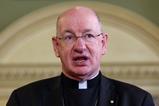The Netflix adaptation of David Nicholl’s book uses story and time to reveal how Dexter and Emma are formed by events and choices. It’s the same way that God writes all our stories, says Tony Wilson

Many of us who have just finished watching the Netflix serialisation of One Day (spoiler alert) will have been drawn in by the stellar performances by Ambika Mod (Emma) and Leo Woodall (Dexter), the excellent screenplay and direction.
By chance, the story, based on the novel by David Nicholls, tracks my era perfectly. Dexter and Emma graduate on the same day as I did in 1988. Yes, we really did have to use telephone boxes to call people when we weren’t at home; we couldn’t find our way with Google Maps and we spent hours recording mix tapes to share with our friends.
God only knows, literally, what 15 July 2024 has in store for us
Set over nearly 20 years, the story follows two young people as the mobile and internet world dawns around them, taking an annual glimpse into their lives every 15 July. The clever literary device keeps the audience guessing; we have to piece together the events between each episode, making assumptions and speculating on exactly why things have turned out as they have.
A messy mix
Dexter and Emma’s lives are a jumble of beauty, tragedy, success, joy, pain, failure and redemption (in a secular sense). In short, the same messy mix that accompanies all of our lives.
If you’re expecting me to write that everything would have turned out wonderfully if only they’d all found Jesus at university and made better life choices, I’m going to resist that trope. The truth is much more complicated than that. We all have a story that plays out over time. And Christian or not, we are all vulnerable to the same kinds of temptations, unhealthy attachments and addictions.
If you are tempted to sit in judgement of the character’s choices (or anyone else’s, for that matter) perhaps you should read the Old Testament. It’s a masterclass on how God’s people made a proper mess of things. Yet the bible itself is one long love story; a revelation of God’s love played out among the lives of his (imperfect) people.
Time and space
When we enter a room, we perceive its length, width and height all in one glance. The room is not incrementally revealed to us, centimetre by centimetre. God sees time in the same way; the past, present and future are immediately before him. While he knows the full extent of our story, he has given us freedom and agency to choose how it is written. We remember the past, but we don’t see the future. God only knows, literally, what 15 July 2024 has in store for us.
Perhaps God chooses to lay out time to us incrementally because ‘story’ is his favoured means of communication. Stories reveal themselves in layers, and we need to encounter and comprehend God gradually. To perceive him completely and entirely in one moment would be impossible for a finite mind.
Faith and formation
The interplay between One Day’s central characters, the events and choices they make are what form them. The dying mother who was brave enough to warn her son against who he was becoming. The friend forced to speak hard truths and hold their love at arms length for fear of being hurt. The child whose first steps were missed. All these are powerfully formative moments.
To perceive God completely in one moment would be impossible for a finite mind
For Christians, the same kinds of events and people may populate our stories, but the addition of God adds a crucial dimension. Daily prayer is our opportunity to hold our stories up to God and ask what our next step should be.
Like a child who holds up a crayon scrawl to a parent, we hold our lives before God in prayer. It doesn’t look pretty but, to God, it is beautiful. He receives it with love and gently helps us to take the next step, with the hope of something more glorious next time.
Christian testimony is a powerful witness to God, and telling it with honesty and humility will draw people to him. Our story and God’s story become one.





































No comments yet